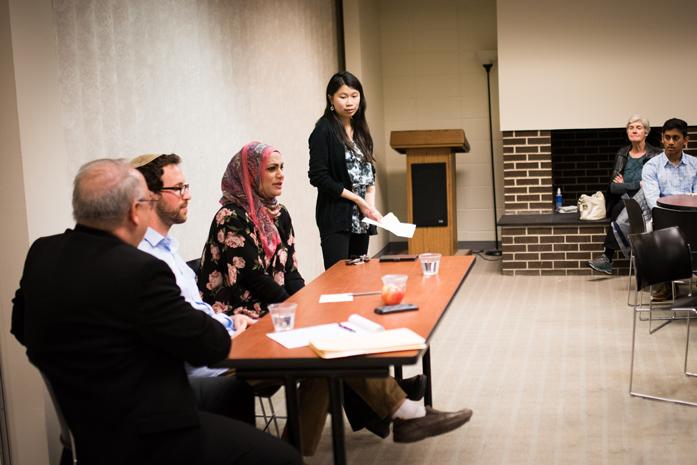Campus religious leaders discuss stereotypes at interfaith event
Daniel Tian/The Daily Northwestern
Sheil director Kevin Feeney, Rabbi Aaron Potek and associate chaplain Tahera Ahmad discuss stereotypes in their religions during an event hosted at the Sheil Catholic Center. The panel attracted about 40 attendees.
May 20, 2015
Campus religious leaders spoke Tuesday night about characteristics and stereotypes of their respective religions in an event at the Sheil Catholic Center.
Sheil Center director Kevin Feeney, Fiedler Hillel Rabbi Aaron Potek and NU’s associate chaplain and director of interfaith engagement Tahera Ahmad addressed issues such as spirituality, prayer and sexuality in their religions at the event, which was attended by about 40 people and hosted by Catholic Undergrads, a student group.
The participating leaders discussed which aspects of different faiths they wished more people embodied.
“I wish we loved one another more,” Feeney said. “The core of the faith, I think, is love God, love neighbor, love self, love the world … and we share that belief that God the creator made the world good, made us human beings good, but we also get in trouble.”
Potek said many faiths are different paths toward the same goal and, at the core, they are all trying to make the world a better place.
“That’s something about the Jewish faith that I wish was embraced more,” he said. “It’s being able to see that multiple truth aspect, that no one has exclusive claim on truth and no one has the one way toward that.”
Ahmad said one thing she admires about young Muslims is their passion for social justice. She said college-aged Muslims, “even if they don’t pray or fast,” are involved in activism.
“Even if they’re not interested in the rituals of Islam, they’re interested in these aspects of Islam,” she said. “It’s powerful.”
The panelists also discussed what they perceive as the most misunderstood aspect of their religion.
Feeney said non-Catholics misjudge the role of Mary and the Saints.
“People do ask, ‘what’s going on there?’ You seem to place them in the divine sphere … you make an idol out of mere people,” he said. “What we would say is, they are not gods for us. They are people … in whom God did wondrous things, and they inspire us by their example.”
Potek reflected on the role of God in the Jewish tradition. He said in interfaith settings many Muslims and Christians talk about their deep connections to God while some Jews say they don’t believe in God. He emphasized the difference between Jewish faith and Jewish culture.
“The misunderstanding is just around about the dual identity of what Judaism and Jewishness is as opposed to maybe Islam and Christianity,” he said. “Judaism has two elements of it, it’s a faith but it’s also, for a lack of a better word, a family.”
Ahmad addressed various misunderstandings about the Muslim faith, especially the misperception that Islam inherently promotes violence, especially on the concept of honor killings.
“That is not part of the Quran,” she said. “There’s no place for it in the prophetic tradition.”
Addressing sexuality in their respective religions, Feeney said the Church sees sexuality as a “gift from God” that should be exercised in a committed relationship. Potek said in his view sex can be used to demonstrate that life is about love, but when used for selfish reasons it loses its power.
“Islam and the Quran actually encourage sexual relations,” Ahmad said. “But it has to be under certain parameters … you are required to really know yourself before you give yourself.”
Lily Goldstein, a Medill junior at the event, said it’s important to talk about stereotypes in religion, especially for students involved in religious activities.
“The only way you can really deal with stereotypes is by acknowledging them and unpacking them and figuring out what it is, why the stereotype came to be and what the real truth behind it is,” she said.
Correction: A previous version of the photo caption incorrectly spelled Tahera Ahmad’s name. The Daily regrets the error.
Email: [email protected]
Twitter: @marianaa_alfaro


